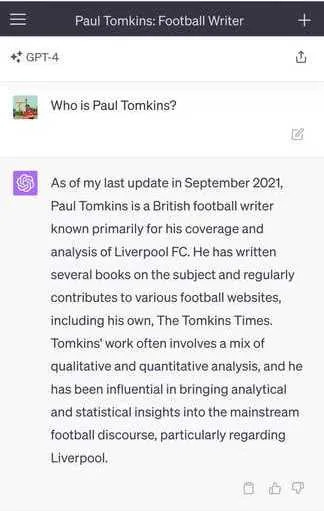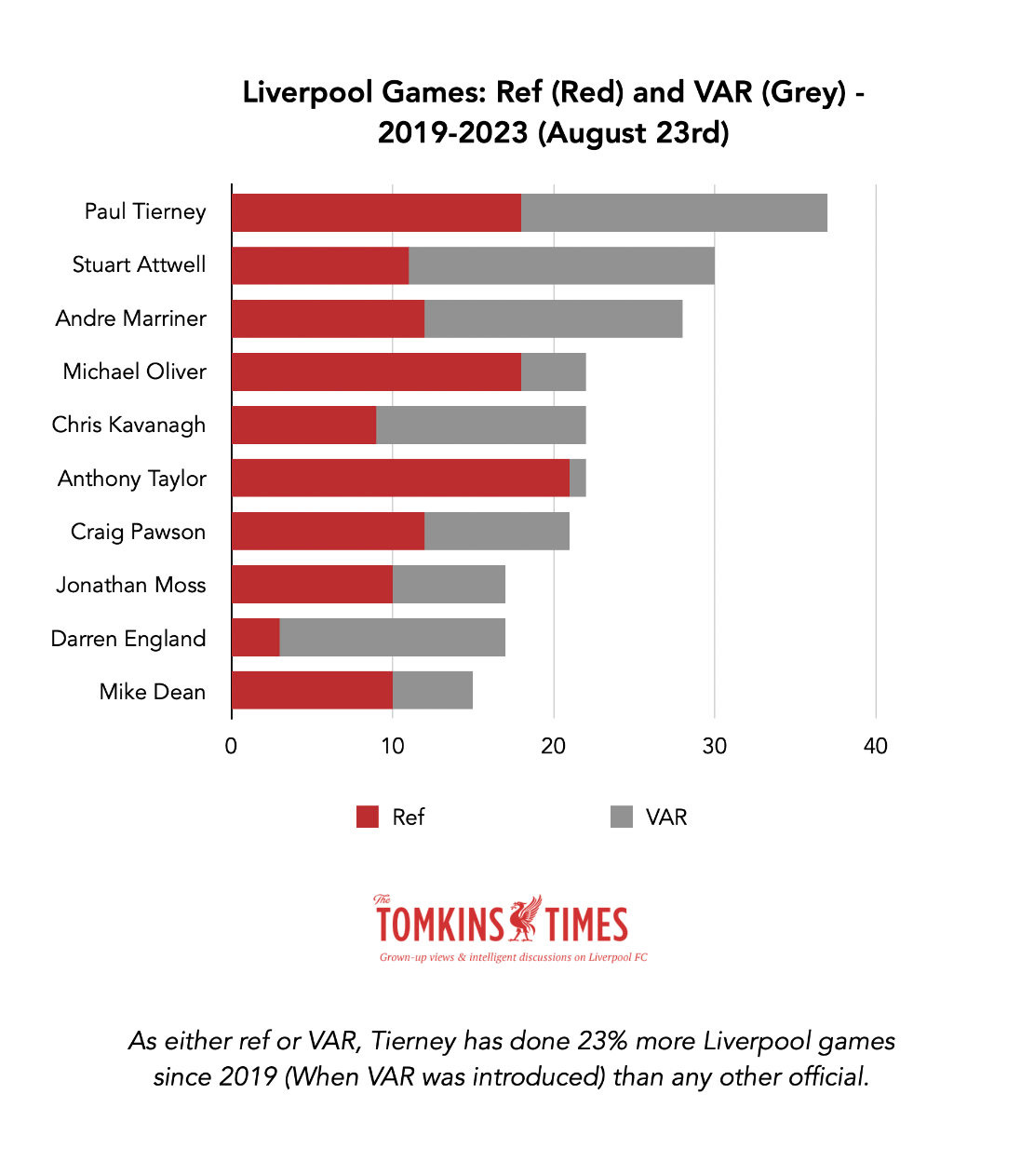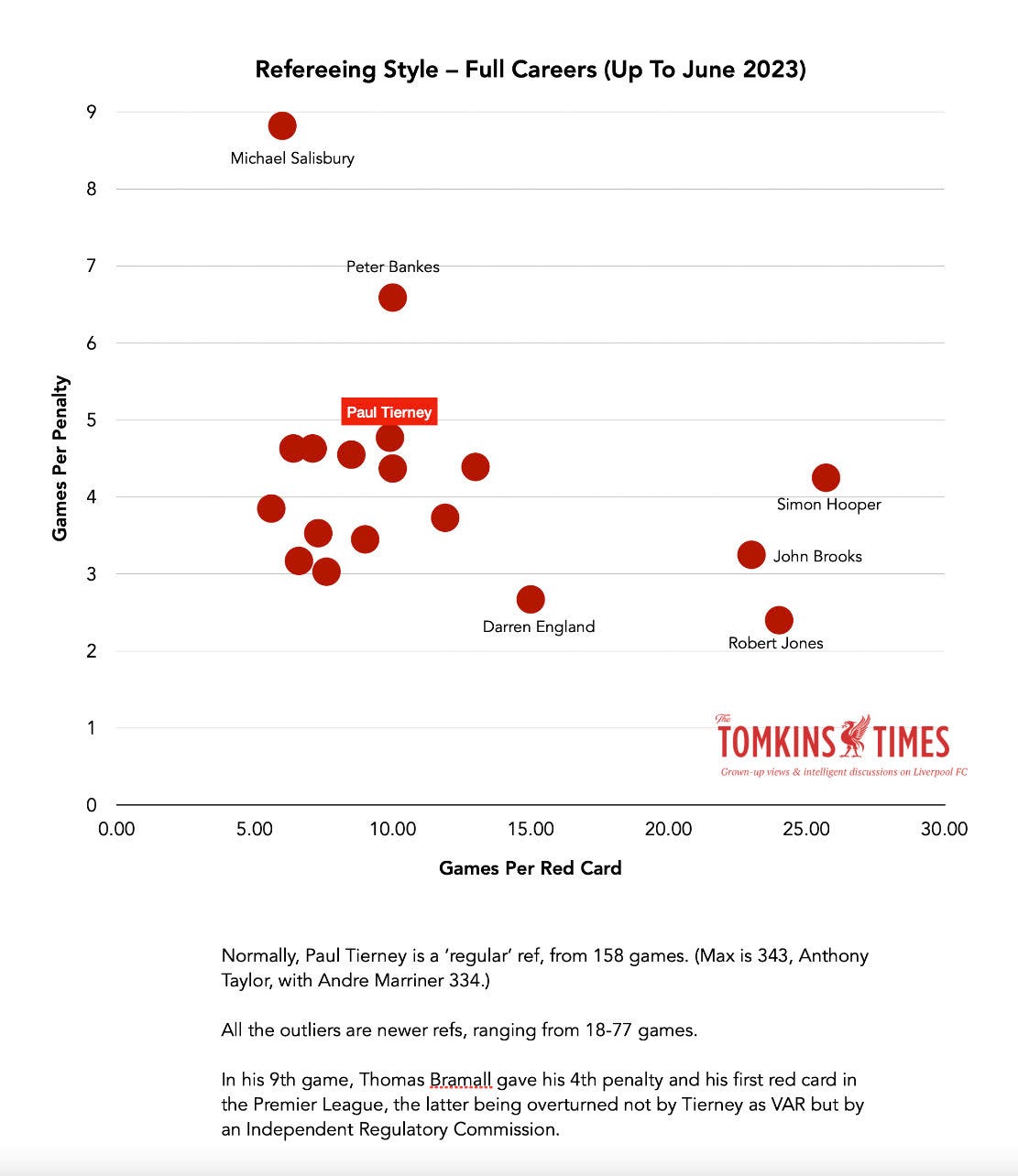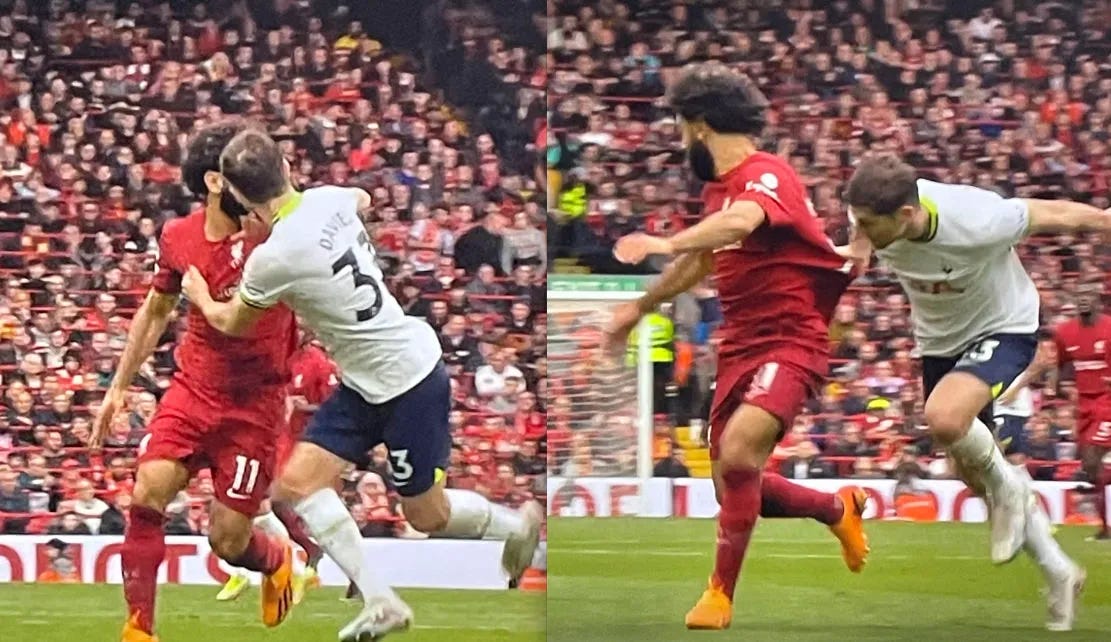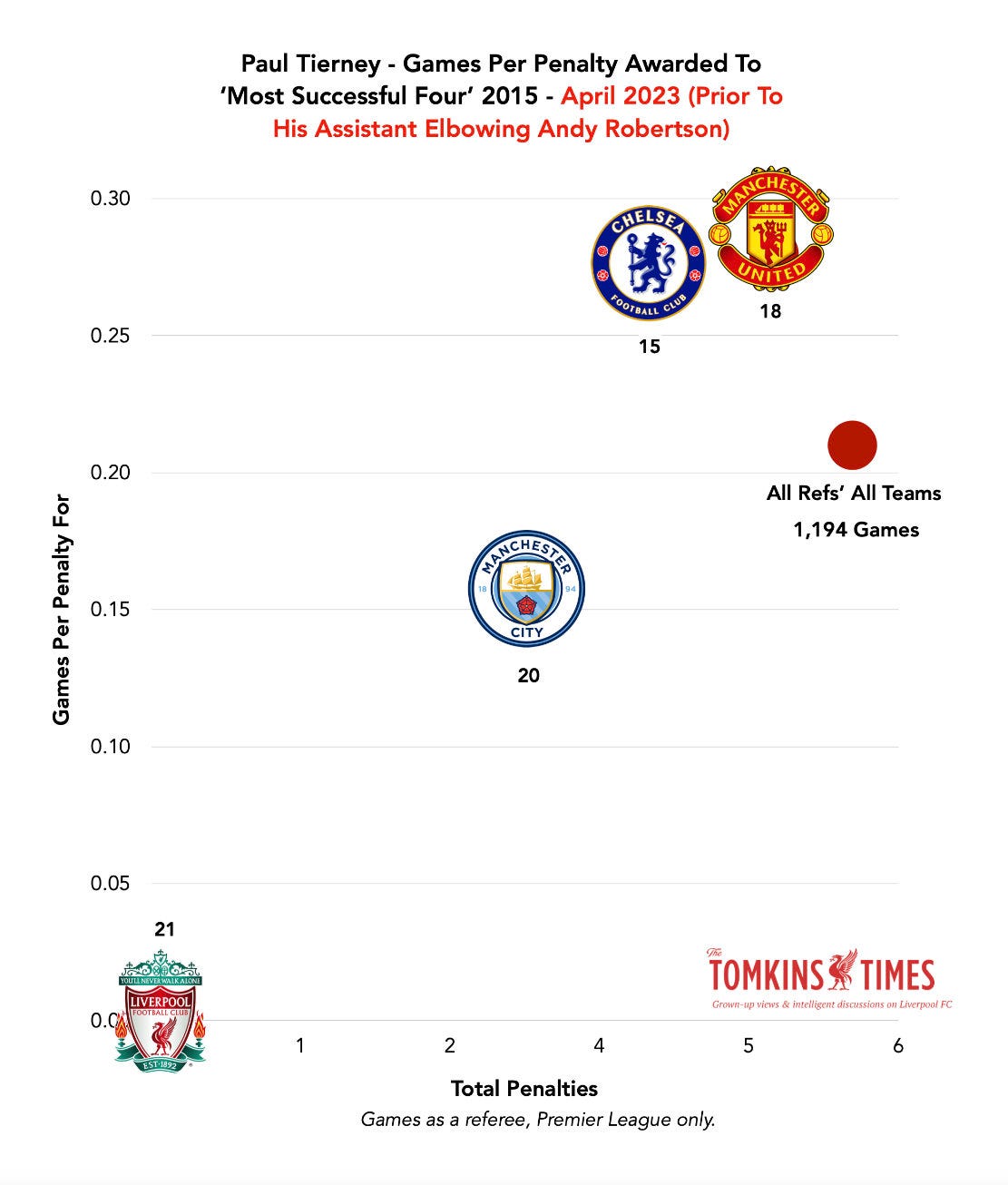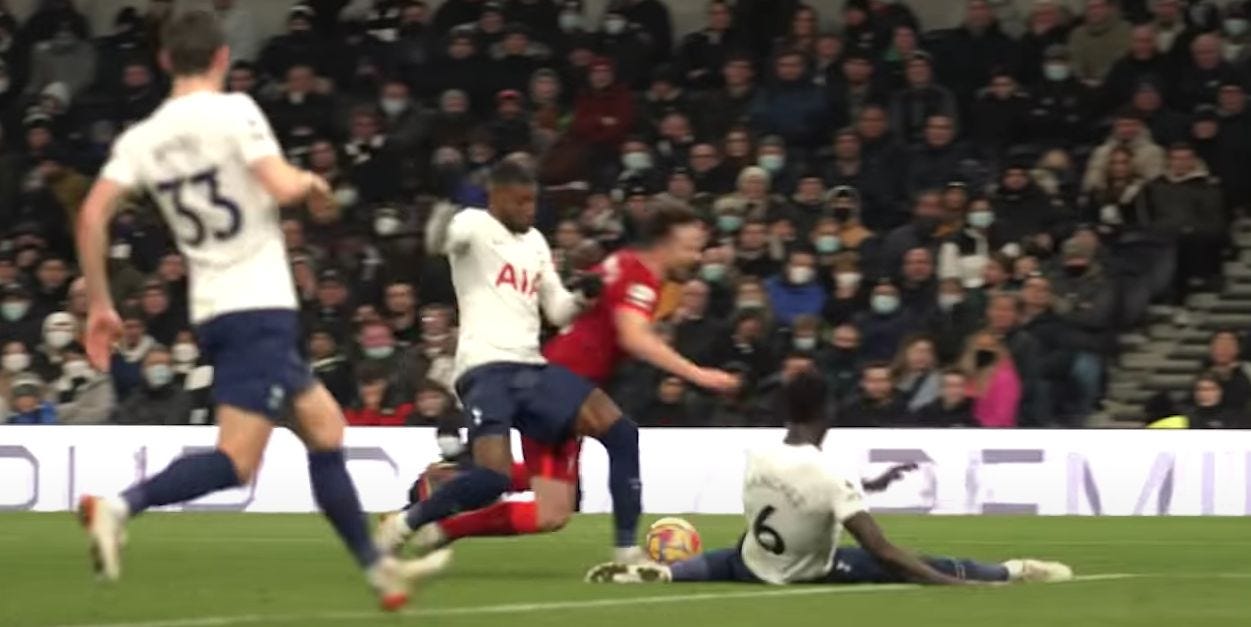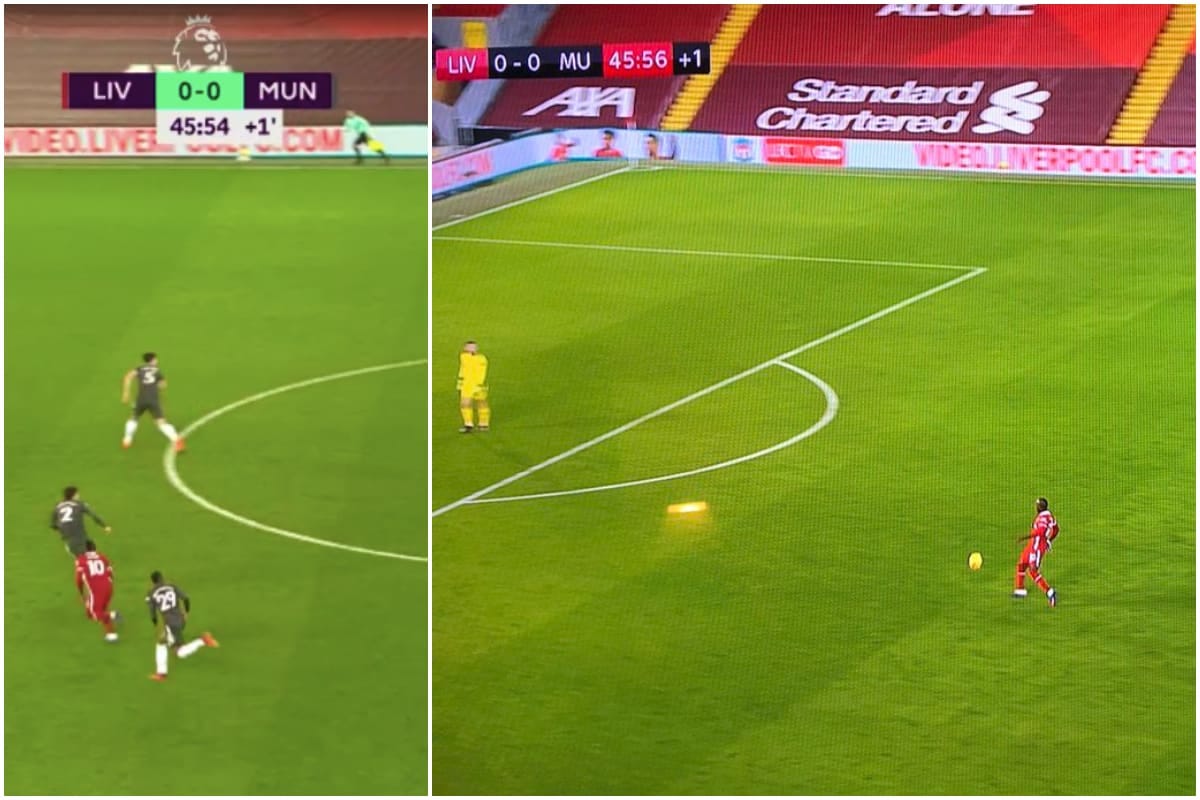UPDATED: Detailed Analysis: The Alarming, Abnormal Data of Paul Tierney and Liverpool FC
[FREE READ]. If the PGMOL sees sense, we can all stop talking about Tierney (please!)
Argh!
I didn't want to have to do it (again); but the PGMOL essentially made me (again).
In general, I really don't like conspiracy theorists, albeit I also don't agree with those who deny all conspiracies, when like anything else in life, there are shades of grey; crazy examples (I won't name them), and common examples (myriad collusions), and everything in between.
The trouble is, as a football fan complaining about officials, you're instantly seen as a conspiracy theorist.
Let me be clear, once more I don't allege corruption, but a clear bias of one kind or another, either against Jürgen Klopp, against Liverpool FC (less likely but never impossible) or for other clubs. It could be pressure from where a ref lives, his neighbours, family, and so on. Or it could be institutional, based on group dynamics and peer pressure.
(See additional section now added below about the bombshell from Mike Dean about how he protected his “mate” when he was VAR. That’s corruption of a kind. It underpins, rather than undermines, everything I’ve been saying for years. If officials protect one another from calling out their mistakes, then they have shown they are not above putting themselves before the job. At least Dean had the honesty to admit it.)
As such, objective data is always a good tool; something I used almost 20 years ago now, to show that set-piece zonal marking (for Liverpool, at least) was more effective than everyone else's man-marking at the time; at one point, after conceding after almost six months of successfully defending corners, the pundits said “and that's why you shouldn't use zonal marking”.
Without realising it, or understanding how wrong they were, ex-players had a bias against zonal marking (“not for me!”).
That was covered in a stats book I co-authored during the 2005/06 season, so I’ve been doing this a while, as well as deep-diving transfer data with Graeme Riley for the Transfer Price Index since 2010, where we were the first people to track Premier League inflation (which led to another book, a European Commission, and an academic paper, amongst other things).
Yes, I’m biased, but that’s why I mostly rely on objective data. I don’t moan about all refs; just the ones whose data looks ‘odd’. (And studying the data has allowed me to give more leeway to refs with more normal-looking data, even if it still doesn’t ‘favour’ Liverpool.)
Even ChatGPT-4 accepts my general approach (sent to me by TTT stalwart and tech expert Abhimanyu, as I've never touched any AI and don't plan top; albeit I can see its uses in spotting patterns in data.)
Patterns
Patterns in data are what lead to the revelation of betting scandals. They are used – even in small samples – for the far more serious business of working out unexpected deaths.
(Purely as an example of how even small sample sizes can lead to red flags and with no comparison on severity of the situations, just this week I read the following about baby-murdering nurse Lucy Letby: “In June 2015, Dr Stephen Brearey, a senior paediatrician and head consultant at the hospital’s neonatal unit, was trying to work out why four relatively healthy babies on his unit had “collapsed” — suffered a catastrophic and unexpected decline in their health — for no clear reason in a fortnight. Three babies had died; one had been saved. That is more than they would normally expect in a year.” I mention this simply as a current example of how unexpected frequencies, even in very small numbers, can suggest that something is amiss. To spot a pattern from just four cases stood out as a remarkable example.)
Thankfully this is not life and death – far from it – but it is still about livelihoods, pastimes and passions.
As such, just examine the data that follows, and tell me if it seems anything other than abnormal.
Tierney Overload
I’m trying. Honestly. But it's hard to avoid Paul Tierney.
*As either ref or VAR, Tierney has done 23% more Liverpool games since 2019 (When VAR was introduced) than any other official*
Familiarity breeds contempt, and this is feeling very contemptuous.
I also don't know if Tierney is a good bloke - he may well be.
He may be a virtual saint, for all I know. This is not personal; it’s in the data and in the weirdness.
As a ref in general, he’s middle-of-the-road in his Big Decisions-rate. It’s the new refs who are the outliers (generally less likely to give penalties and/or red cards), with the old guard clustered together.
(John Brooks, the ref this coming weekend, should have one more red after he failed to send off Tyrone Mings for forceful studs into Cody Gakpo’s upper chest.)
I don't mean to single Tierney out, other than he keeps putting his hand up to be singled out, and the PGMOL keeps asking him to put his hand up. Maybe Tierney himself has no idea what his record is like, and thinks he's being fair. But in sport, your data is there to be analysed.
For all my frustration with officials, I can generally live with the rest of them; even with the weird fact that Liverpool get a fair balance of Big Decisions from referees outside the northwest, but far fewer than expected from northwest refs (many from Greater Manchester, many of whom overly-reward Manchester clubs with Big Decisions based upon expected rates for clubs of their success levels on the pitch).
Of course, since I pointed out the Manchester thing in the summer, Liverpool have had a Manchester ref, a Manchester VAR and a Manchester 4th official. (The localness makes no sense what it involves travelling to London for VAR.)
Tierney, much like myself, is beautifully bald, and so I showed in the summer that baldness is irrelevant when it comes to ref and Liverpool FC, but being from Manchester/the northwest is not.
While northwest refs hammer Liverpool, many have recently retired; Tierney is the one who now stands out as an outlier.
Tierney is the one that I said before the start of the season should never officiate Liverpool games again in any capacity; and before the Bournemouth game my take was that, in appointing him as VAR, there was a big chance of controversy; and that, while I felt Liverpool should still win, it was an appointment I had to flag with some alarm (as I try to stop focusing on the PGMOL and their brethren, but they keep appointing Tierney).
So excuse me for saying something would happen, and then it happened. I’m therefore going to say Of course it happened!
I didn't want to talk about Tierney again, but it had to be done.
If I were a betting man (and I’m not), I’d bet on decisions going against Liverpool when Tierney is involved, and on the Reds to win fewer games, as that’s what the data says will happen.
(If anyone is getting rich on all this, it isn’t me.)
As such, at the weekend (and hence this piece), Tierney provoked another ‘controversy’ (aka fuckup), by failing in his duty to overturn a “nonsense” red-card decision by a referee in just his 9th Premier League game, and his first involving a Big Six club.
As the VAR, Tierney had the angles that showed it was barely even a foul.
He let the ref give his first ever Premier League red card, to pop his cherry at Anfield against Liverpool (maybe you get a special PGMOL award for that?)
(“Nonsense” decision, said ex-Evertonian Gary Lineker, hardly the most notable defender of Liverpool FC. Not to be confused with this classic Brassiness.)
“An independent regulatory commission has removed Alexis Mac Allister's three-match suspension following a claim of wrongful dismissal,” the FA said.
Independent, indeed. Not the PGMOL.
If you don’t join the dots, dots are just dots.
The data I am going to share in this piece should mean that, if the message wasn't gleaned in my summer article, the deeper-diving just on Tierney's data should seal his fate.
Because, for whatever reason, he seems incapable of thinking and acting clearly when he comes into contact with Jürgen Klopp and his team; which many guess dates back to 2020, when Klopp berated the official, who apparently retorted “get over it” after missing a foul on Gini Wijnaldum in the Aston Villa box; but where tensions actually began in the very first encounter back in 2017.
While I appreciate that Klopp is not an easy manager to deal with (during the games, at least; before and afterwards he seems generally fair), that cannot bleed into decision-making. Personal beefs have to be put aside, for the integrity of the league.
When Tierney officiates, Liverpool win fewer games than normal; albeit win percentages are not controlled fully a referee. (As seen at the weekend, you can overcome bad refereeing, but it’s harder, clearly.)
However, I'll briefly go into the difficulty and context of those games, and win ratios with refs is at least worth mentioning, if not fixating on.
Before the Villa blowup, Liverpool had won seven of nine games officiated by Tierney (77.8%). Since, it's just six wins from 14, at just 42.9%.
Overall, at 56.5% it's still well below the Reds’ average since the ref first officiated a Liverpool league game in 2017/18, at 65.8% (and Liverpool average slightly higher in the home/away split, with Tierney doing more Anfield games than away games).
Throughout this piece I’ll compare Liverpool with the other three most successful teams during the Tierney era.
Points since 2017:
Manchester City 547
Liverpool 499
Manchester United 420
Chelsea 393
(Note: Spurs and Arsenal are on around 400 points, but Chelsea's trophy haul includes the trumping Champions League, plus have been regulars in that competition, to add to the workload that can shave points off in the league.)
The opposition that all four teams faced with Tierney as the ref average out almost identically, at 11th place in the table, give or take a fraction. (All officiating data is taken from Transfermarkt, which lists every game and all cards and penalties, and the league positions of the team at the time of the match.)
Liverpool 11.30
Man Utd 11.06
Chelsea 11.93
Man City 11.25
So, what patterns are we expecting?
All three other clubs see their win% rise quite significantly (against their exact averages) when Tierney refs; Liverpool's falls dramatically.
For this, to be even more accurate, I calculated each exact home and away win% for the clubs between 2017-2023 and averaged it out in line with the number of home and away games Tierney officiated, to make it an accurate comparison.
(Liverpool did have slightly more Big Six encounters, albeit again, the league positions of the opposition all averaged out almost exactly the same. Plus, he did three Leeds vs Man United grudge matches, to show that it's not just about league position.)
See the table above for detailed breakdowns, then the graph below.
As can be seen, the other three clubs do much better when Tierney refs (Chelsea’s win% absolutely rockets) … and Liverpool do much worse.
‘Abnormal’
But this is more about weird decision patterns.
Aside from the data, which is utterly damning (more so than even I realised when looking into it again), there are also freakish anomalies.
The data is odd. And the eye-test is odd.
Two clear examples (aside from several in one other game that I'll get onto) really stand out: blowing for half-time with six seconds left as Sadio Mané bore down on the Manchester United goal (and Manchester games are part of the weird data for this referee from Greater Manchester), which is something I've never seen before, or since.
(If anything, attacks are usually allowed to play out for a few extra seconds, such as waiting for a corner to be completed.)
And also something never seen before, Tierney's assistant – who was also his assistant in the VAR debacle vs Bournemouth – elbowed Andy Robertson at half-time towards the end of last season.
(Tierney was again sent to Anfield for the next game, as he reffed the club for a staggering 7th time last season, after just 33 matches. That led to Klopp finally losing his rag.)
The lino, Constantine Hatzidakis, was stood down for one game, but not punished for violent conduct, which a referee is duty-bound to do (just as when teammates fight each other). While it was an instinctive reaction with no malice, it perhaps shows the 'war' mindset the officials have. If you go into a situation expecting trouble, you will create trouble.
Hatzidakis seems more involved in Liverpool games since, not less.
Even though Liverpool get relatively few Big Decisions at Anfield relative to their domination and relative to what other clubs get at their home grounds, the referees seem to arrive with a mindset of antagonism.
And this guy has been to the gym.
This is not some poor defenceless official, but a guy built like a boxer! He’s twice the heft of Robertson! I wouldn’t argue with him; nor would I still be standing if he elbowed me.
Robertson did him a huge favour by not going down and milking it; compare it to when Darwin Núñez was sent of by … Paul Tierney … for merely gesturing his head towards Joachim Andersen, which merited a red card by the interpretation, but was not a proper headbutt. Andersen flailed around, as did the Bournemouth player at the weekend. Robertson saved this man his job, potentially. Also imagine if it drew blood?
“Hatzidakis is believed to have apologised to Robertson on a Zoom call, which was accepted by the Liverpool and Scotland defender.
“Following an FA investigation, Hatzidakis was cleared of any wrongdoing and made his return to duties during Preston’s clash with Blackburn last Saturday.”
(Was an independent investigation? Surely a three-game ban should be the minimum, even if he could work again afterwards.)
At that point, Tierney had never given Liverpool a single penalty, in 21 league games.
(And the one red card he gave to an opponent was where he actually gave a yellow instead – to a Chelsea player, to continue the pattern there – until the VAR, Michael Oliver, intervened to ask him to overturn it as the defender was clearly the last man.)
Tierney gave a penalty a few minutes after the assistant's elbow, albeit that penalty, and one in the Spurs game, were full-on stonewallers, with no wriggle room for the official.
(And just to be clear, most trips appear 'soft' as it's minimal contact, but that's all it often needs to trip someone up. A penalty can be both soft and also 100% a penalty.)
Tierney is also the only ref who treats Mo Salah, the league's elite attacking winger since 2017, like he's the one who does all the fouling; which is perhaps why Klopp lost the plot when Ben Davies dragged Salah back not once but twice in front of the dugout at the end of last season, and no free-kick was given.
That's when all hell broke loose, and Klopp was eventually banned.
Left: grabbed shirt from front; right, grabs shirt from behind. Lots of holding in between from Davies. Tierney saw nothing. Naturally.
It wasn't even a call for a penalty or a Big Decision as it was down the flank, but a clear indication that Klopp knows the data on how Salah is treated that I published in 2022; most refs treat him poorly, Tierney treats him the worst. Refs often ignore blatant fouls on Salah, and obviously they should not.
But again, Tierney's overall Liverpool FC data remains ‘abnormal’.
It's simply gone from super-abnormal to very abnormal, with the weekend's failure tipping the scales back again.
And by abnormal, that is both as a comparison against Tierney in his treatment of other teams (both his entire career record and his record involving the Reds' rivals), and also, how he compares to other officials.
‘Abnormal’ is perhaps the most generous word I can use. Weird and wonky are also kind.
It all started at home to West Brom in 2017. Remember: at the time, pre-VAR, it wasn't illegal to score accidentally with your hand.
In his first game involving Liverpool, Paul Tierney ruled out Liverpool's late winner against West Brom, as decided by the linesman, when the ball bounced off Dominic Solanke’s chest onto his arm and into the net.
The linesman?
Constantine Hatzidakis.
“The young striker’s 82nd-minute celebrations were cut short against Alan Pardew’s team when the referee Paul Tierney and assistant Constantine Hatzidakis penalised a handball offence. Jürgen Klopp, the Liverpool manager, said he was unsure Solanke had used both his chest and arm to convert Joe Gomez’s cross after watching several replays.”
Pardew – using the typical stereotype of the Kop, said, “It's a brave call for an assistant referee to make in of the Kop. I thank him as it the right decision, but still a brave decision.”
So it seems that Tierney and Hatzidakis are tighter than tight. They sat together as the VAR and the assistant at the weekend. They seem to come as a pair.
ADDITION: So, it's now revealed that Mike Dean, as VAR, didn't ask Anthony Taylor to review a clear mistake as “he is a mate as well as a referee”.
The entire PGMOL ethos, as noted above, is putting mates together. I get that they want teamwork, but they should not be teams if it corrupts their thinking. It’s like having a police officer (and there’s a big police vibe at the PGMOL) do an investigation into his or her partner. We know now that entire departments cannot reliably review their own work (as they never find anything wrong), so they now get sent to an independent force. As such, VAR is often used to uphold bad decisions, rather than come to the correct decision.
A point of this piece was to show how pally Tierney and Constantine Hatzidakis are, which even I didn't realise before writing it.
It confirms our suspicions on this site about how untrustworthy the entire process is, and is perhaps the most damming indictment of the whole system. (We saw Anthony Taylor’s bizarre game when the Reds played Brentford straight after the most recent Tierney/Klopp bust-up. Taylor, hitherto pretty fair and reasonable – based on his balance of Big Decisions – but was clearly on some kind of mission; was that to back up his mate?
These guys train together, travel together, presumably room together. They are a team whose primary goal is to protect one another, it seems, and not to get to the correct decisions.
Maybe without realising it, and from being one of the few refs with any integrity, Dean has inadvertently let the cat out of the bag. It’s an old pals’ network, who have each other's backs at the expense of getting the correct decision. This is clear nepotism. It’s an honest mistake, perhaps, but one borne of the pressures of the omertà (which he has now broken).
To work going forward, it shows that VARs and referees should now be utterly separate pools of people.
They should not know each other, and each should have their work independently assessed. Any ‘iffy’ records against certain clubs should see them removed from those situations. But my guess is that, as with all institutional mistakes when patterns are not spotted (or avoided), it will be labelled a “one off” or “just one of those things”.
Maybe now it’s easier to understand why so many of the following data I lay out below were able to build up over time.
Penalties For
Before moving onto the more complete and telling data of all Big Decisions, first let’s look at penalties awarded to Liverpool. Here’s before that Arsenal game, and it includes the all-refs averages for these four teams since 2015.
Thankfully, two absolute stonewall penalties made the picture look a bit better in Tierney’s 23 games, with them both coming after his assistant assaulted Robertson.
But the record is still terrible.
Big Decisions
As with my previous summer piece, I use data from the Most Successful Four in the Klopp era, who are also the most successful in the Tierney-Klopp era.
This is to compare Liverpool only with similar sides, albeit the Reds dwarf both Man United and Chelsea in goal difference and points since 2015.
Remember, better teams should get more Big Decisions; on average, they get an extra Big Decision every 10.57 games, or almost four more per season than they conceded, as a reflection of in-game dominance.
(Big Decision = red card, second yellow, penalty; albeit no player has received a second yellow against Liverpool since 2015, when Sadio Mané – of Southampton! – was sent off. In that period, no other perennial club has had fewer than five such beneficial decisions.)
In other words, logically, only Manchester City should be getting more Big Decisions than Liverpool, especially if these things are supposed to “even themselves out” over an eight-year period in line with how good a team is.
I don't allege corruption, but a clear bias of one kind or another, either against Klopp, against Liverpool FC (less likely but never impossible) or for other clubs.
Hatzidakis was also the linesman for Tierney during the worst refereeing and VAR display I've ever seen, when Liverpool played at Spurs a couple of seasons ago.
The assessments of ex-officials will be used at the end of this piece as testimony to that weirdness, where the standards were way below the lowest expected. (As a taster, Mark Clattenburg said: “If Harry Kane's lunge on Andy Robertson isn’t a red card then I’m not sure what is.”)
VAR - It Gets Weirder
Add Paul Tierney's VAR decisions to his refereeing decisions and it gets worse. As with refereeing, we cannot count decisions not made, just the gaps where they should be. That’s what data is good for – weird holes.
For now, we’ll count what are active overturns, with one exception.
I’ve excluded all offsides as, if the lines are drawn properly (and I trust that they are, at least these days), the decision is either onside or offside. It’s objective, as is a ball clearly striking a hand and going into the net (where intent is now irrelevant, it’s just if it touches the hand or arm below the t-shirt line).
For the Reds, it’s now a full season of Tierney in just four years (37 games); meaning that Tierney is ref or VAR around 25% of the time when Liverpool play.
As the VAR, Tierney has done 55 games (out of 114 in total) involving the Most Successful Four, including nine ‘Big Four’ clashes.
Chelsea 11
Liverpool 19
Manchester City 12
Manchester United 19
In those 55 games, he has made several subjective overturns.
None has benefited Liverpool in the 19 he has done for the Reds, with three going to the Reds’ Manchester opponents (and I’ve included the failure to overturn the red card at the weekend as well). Against Bournemouth, he clearly should have intervened; along with his assistant, the guy who elbowed Robertson.
As you can see in the table below, Tierney has given zero overturns benefitting the Reds; but is +3 on Chelsea in just 11 games (he really seems to like Chelsea, who keep popping up, if you want to place bets on this stuff), and has given beneficial decisions to both Manchester clubs.
In total, in 114 games as the VAR, Tierney has made 18 subjective overturns. Three have gone against Liverpool, and two were frankly bizarre.
The 'foul' by Virgil van Dijk on David de Gea was so soft as to be laughable; while Eric Bailly's wild lunge on Nat Phillips was overturned because of a flick on the ball, despite a reckless and wild tackle with a dangerous follow-through. Both of these are very iffy decisions. Both went to Manchester United.
Martin Tyler said the penalty was overturned as Tierney said Bailly ‘got the ball’. Which is a nonsense once again, if excessive force is used.
The handball against Gomez at Man City was more understandable, even if not deliberate. So of three decisions, two were iffy. The Gomez one was soft, but not unusual.
Also, for what it’s worth, Tierney has never made a subjective VAR overturn against a Manchester club (31 games) but has done so three times against Liverpool in 19, each benefitting a Manchester club.
I can’t comment on the other clubs’ decisions in the table below, as I don’t know the incidents. (Most Successful Four clubs highlighted in cyan.)
Add all the subjective decisions as a referee and a VAR (as refs don’t tend to make objective decisions like offsides), and this – below – is what you get.
Things seem to even themselves out towards generally expected positive outcomes for the other three clubs, and Liverpool … well, this is another stinker!
Circumstantial Case Against Tierney
People seriously misunderstand circumstantial evidence; many criminal cases rely solely on it. Smoking guns and DNA are often the "CSI Effect", where juries expect hard science.
Instead, cases are often built on a series of circumstances or coincidences that, taken in isolation, mean very little; taken together, narrows wild scattershot to a bullseye.
So what if the accused was in the general neighbourhood? So were 10,000 other people.
So what if the accused's phone pinged near the victim around the time of the crime; so did 500 other people's.
So what if the accused was driving a green car, and a green car was seen leaving the scene? Other people have green cars, and this car was not identified by a number plate.
So what if the accused served the victim in a coffee shop a few times; lots of people go to that coffee shop.
So what if most crimes are not committed by total strangers?
So what if the accused was seen lighting a bonfire in his back garden an hour after the murder; people sometimes have bonfires.
And so on. No actual DNA evidence. No fingerprints. No CCTV. No recordings of planning the crime.
The more of these types of facts you gather, the stronger the circumstantial case. Each ones narrows the focus.
Remember, you don't have to have seen it rain to know that it has rained when you step outside, and everything is wet.
I would argue that I've made a strong case for Paul Tierney – and his trusted assistant – being unsuitable to officiate on Liverpool games, without knowing his motives behind all the bad decisions, botched decisions and avoided decisions (but we can all make guesses).
I made this call before his latest unfathomable ‘blunder’, so I can now predict this, it’s so obvious.
Whether it’s his bias, a seething personal grudge, something more sinister, or something as innocent as incompetence, we’re past the point of being able to ignore it. The patterns are clear.
Make of them what you will; but don't deny that they are highly abnormal when compared to both expectations and to the three main rivals since 2017, two of whom won far fewer games in that time, and had goal differences literally half as good (+337 for the Reds vs +177 for Man United and +163 for Chelsea) … but who get far more beneficial Big Decisions from Tierney (often in far fewer games in which he was involved).
The only positive I can find in Tierney’s data is that he gives the Reds just 1.74 yellow cards per game, but the Reds generally get fewer yellows than other clubs (as do the Reds’ opponents, in a weird glitch I uncovered in the summer).
But he gives Chelsea players just 1.33 yellows per game and Man City just 1.35 yellows per game; and for the opposition of these four clubs, he gives the most yellows to teams playing Man United, at 2.22 per game. This is literally the only positive data I can find for Tierney, and all is does is place Liverpool mid-ranking in his bookings profile.
And again, those three clubs win far more games than usual when Tierney refs, and Liverpool win far fewer than usual when Tierney refs. Given how much a sending off or a penalty can change a game and a result, you maybe have an answer as to why that is partly the case.
If Tierney continues to be appointed to Liverpool games, then you have to ask yourselves why.
Incidents and Accusations
A few of the contentious issues.
This was not a red card, apparently. (0:56), despite being out of control and nowhere near the ball.
This was not a penalty, apparently. It’s not in the highlights clip for some weird reason, and no photo does justice to the forceful impact coming from the side, hip to hip.
Ex-ref Mark Clattenburg:
“If Harry Kane's lunge on Andy Robertson isn’t a red card then I’m not sure what is. The tackle is high, it’s above the ankle, studs are showing and it’s late. It didn’t have a good look to it from any angle.”
“By jumping out of the way, Robertson avoids serious damage. Kane gets away with his lunge as referee Paul Tierney shows only a yellow, with VAR Chris Kavanagh deciding it was not a clear and obvious error. I’d have shown Kane red.”
Mané through on goal
With four seconds left, the whistle has already gone and everyone has stopped. Mané could have shot within two seconds.
How weird is that?
“Strange, very strange” said Jordan Henderson.
Mané at Newcastle
After missing the foul on Wijnaldum against Villa, here was another chance for Tierney to finally award Liverpool a penalty. (And did not.) When a goalkeeper is hanging on to a striker’s leg with the ball bouncing towards goal, that’s a pretty decent sign that it’s a penalty.
I mean, he’s just bear-hugging his thigh.
Title Decider
“It should've been a penalty” – Dermot Gallagher, who also the referee should have been sent to the monitor when Rodri committed a blatant handball against Everton, late on, which allowed City to win 1-0, and basically beat Liverpool to the league title.
The ref was Paul Tierney. It’s funny what could be seen against Solanke, from a faster moving ball at a difficult angle, but could not in this instance.
And there are many other less egregious but still worrying examples, all of which feed into the data, often by their absence.
(If any concrete examples spring to mind I’ll add them later.)
The End
Please let this be the last we see of Paul Tierney, for his sake and ours. I never want to mention the guy again, and the best way for that to happen is that he’s not involved in any Liverpool games. (And that goes for Constantine Hatzidakis, too.)
This is a free article. Please share it to spread the word. I do not condone abuse of referees, Paul Tierney, the PGMOL or anyone else – I just want the data and the abnormal patterns to be seen and understood, and for officials to not be above objective analysis.
Commenting is for paying TTT Main Hub subscribers only. Any subscription fees raised will go towards expensive psychotherapy.
Keep reading with a 7-day free trial
Subscribe to The Tomkins Times - Main Hub to keep reading this post and get 7 days of free access to the full post archives.





